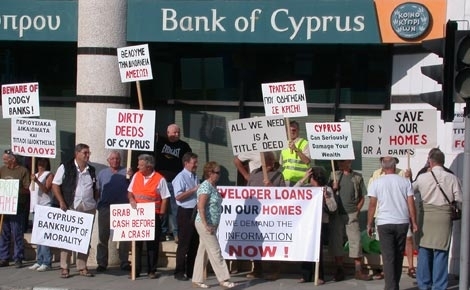Finance Ministers and Central Banks throughout Europe are keeping a close eye on developments in Cyprus this week as the Mediterranean Island nation's financial institutions have been closed down amidst a financial emergency and increasing protests from the public.
Cyprus’s central bank said lenders would remain closed until at least Tuesday amid growing speculation the Meditterranean island could become the eurozone member to exit the currency bloc.The European Central Bank's statement came after the Cypriot parliament unanimously rejected an European Union bailout that would have required a tax on depositor's savings accounts. Reportedly the initial terms of the bailout would've taxed accounts of €100,000 or less at around 5%, accounts between €100,000 and €500,000 in the neighborhood of 10% and accounts of €500,000 and more at 13%.
Officials at the ECB were reported on Wednesday to be considering pulling the plug on Cypriot banks unless the country agreed to a new bailout package.
Jörge Asmussen, the ECB’s chief negotiator, warned that Cyprus’s decision to reject the terms of an €10bn (£8.6bn) bailout meant it could not guarantee support to domestic lenders for much longer.
“We can provide emergency liquidity only to solvent banks and... the solvency of Cypriot banks cannot be assumed if an aid programme is not agreed on soon, which would allow for a quick recapitalisation of the banking sector,” said Mr Asmussen in an interview with a German newspaper.
Cyprus has been a popular offshore venue for wealthy Russians to deposit their money in recent years, and the Cypriot finance minister is in Moscow negotiating with his Russian counterparts on a new deal that would see greater Russian involvement in the Cypriot banking and offshore energy sectors on Wednesday. Russia had earlier threatened to withhold any aid from Cyprus after being left out of the talks between the island nation and European Central Bank.
There are also an estimated 3500 British military personnel stationed in Cyprus- the UK dispatched a military transport loaded with €1 Million in cash in the event that cash ran out at the ATMs or debit cards stopped working on the island. The Ministry of Defense also stated that the personnel stationed in Cyprus will not have the option of their wages deposited in a British or Cypriot bank.
Cyprus- also a former British colony- is home to a number of retirees from the UK. The island nation also has historically close ties to Greece and the Cypriot economy took a massive hit when a significant portion of the Greek soverign debt held by Cyprus and others was written off last year

With their economic crisis, it is not surprise that banks and businesses in this place would experience bankruptcy.
ReplyDelete